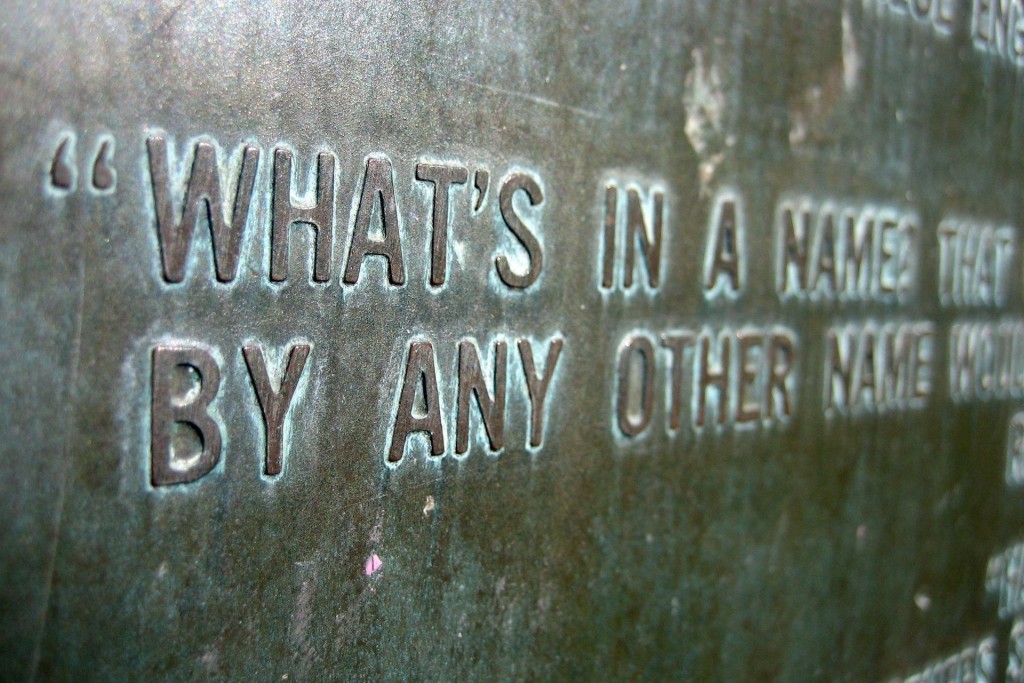Herbert? Mary? Atticus? Rosita?
Naming a baby is hard.
Should you go with a traditional name? A trendy one? Will you hand down a family name or give them something completely unique?
There are so many things to consider before making a decision:
- Will the child suit their name?
- Is the name difficult to pronounce?
- Will you grow tired of it?
- Is it too common, or too uncommon?
Naming fictional characters can be every bit as difficult as naming your own child. After all, you have the same factors to consider.
So, what are the ideal names to use, and which ones should you steer clear of? Here are some guidelines about what to avoid when naming your characters, and tips for helping you choose wisely:
[*Note: each of the following tips applies to surnames, as well as given names.]
Names That Don’t Fit
This is probably the biggest naming dilemma. Just as you might fear about your own child’s name being unsuitable, you don’t want to saddle your character with an inappropriate name.
Be aware of the following considerations:
- Names with certain connotations or meanings: What are the first images you conjure upon hearing the names “Vlad,” “Heathcliff,” or “Scarlett”? Don’t be too worried about the subliminal meaning of the names you choose, but do consider common perceptions. You wouldn’t name a shy and conservative character “Lolita.”
- Names from the wrong era: “Hayley” or “Jaiden” would be inappropriate names for characters in a historical book.
- Names from the wrong culture: An Italian probably wouldn’t be named “William,” and an Englishman wouldn’t suit “Pasquale.”
- Names that detract from the character’s image: I don’t know about you, but a villain named “Benjamin” or “Timothy” just wouldn’t convince me.
The only good reason to name your character something that doesn’t fit is if you’re being deliberately ironic, or if some element of your plot demands it.
Names That Are Difficult To Pronounce
There’s not much point in naming a character something no one will be able to pronounce. It’s fine to choose something uncommon (or even something you made up), so long as it can be sounded out. Alternatively, if you want to use something that isn’t spelled phonetically, make sure it’s common enough that people will recognize it.
- “Caoimhe” (KEE-vah or KWEE-vah) isn’t spelled phonetically and it isn’t well-known. Most of your readers would be forced to either look up how this name is pronounced, or remain ignorant.
- “Astrielle” is a name I just made up right now. I’ve never heard it before in my life (pardon me if your name is Astrielle), but anyone could look at it and know how it’s pronounced.
- “Siobhan” (Shi-VAWN) is a name that’s not spelled phonetically. It isn’t terribly common, but it’s well-known enough that the majority of people will recognize it.
Another pitfall to avoid is naming your character something that could be pronounced in more than one way. For example, “Briony” from Ian McEwan’s Atonement can be pronounced BRI-o-nee or BREE-o-nee or Bree-O-nee. While I don’t think McEwan made a bad choice in his character’s name, I was annoyed at myself for having thought it was pronounced one way, only to watch the movie and find I was mistaken.
Would it bother you if your readers felt the same?
Names That Are Too Similar
If your story has more than just a few key characters, you want to make it very easy for your reader to distinguish between them. That’s why you should avoid using names that sound too similar:
- Similar beginnings: Readers might be confused by a “Cathy” and a “Cynthia,” or a “Richard” and a “Roger” in the same story.
- Similar endings: Avoid giving your characters names that end the same way, like “Madison” and “Jason,” or worse yet, names that rhyme, like “Shelley” and “Kelly.”
- Repeated vowel sounds: “Janeen,” “Lee,” and “Edith” all share a long ‘e’ sound. This can be tiring for the ear.
- Similar length: You’d be confused too if you had to read a book about “Bob,” “Ted,” and “Joe.” How would you keep them all straight in your mind?
Now, before you go and say you’re writing about a set of twins, just remember: names can have a similar feel without sounding alike. For example, “Matthew” and “Luke,” (both names from the Bible) or “Ava” and “Bette,” (both Hollywood film actresses).
Keep in mind, you want your characters to stand out as individuals, not meld in your readers’ minds.
Names You Just Happen To Like
You know there are names you’ve always liked. Maybe they’re names you picked out for your kids, or ones you wouldn’t dare give your children, but you could easily slap them on a fictional character.
Be aware, it’s often painfully transparent when an author arbitrarily chooses a name based on random preferences. Read any story written by a 12-year-old girl and you’ll understand what I mean. However, I won’t give examples for this category because no two people will have the same favourites.
If you’re wild about a name that just happens to suit your character perfectly, by all means go for it. Just don’t force your favourite name on a character without a good reason.
The Perfect Name
You’re writing a fabulous story, so you want your characters to have equally fabulous names. Remember to choose names that are:
- Clear
- Suitable
- Unique
- Meaningful
Do you have any other guidelines you keep in mind when choosing names for your characters? Can you think of any examples of when it’s necessary to break these rules? Are there any characters in literature you feel were misnamed?
